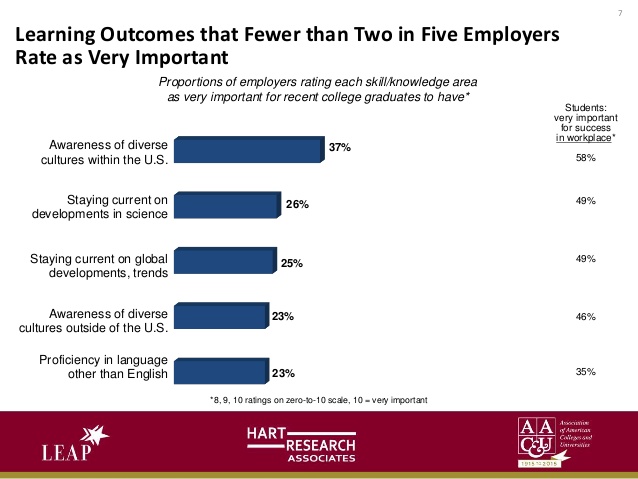Debra Humphreys, vice president for policy and public engagement at AAC&U, thinks this wide variance in opinion between the groups is natural. “I think it is a combination of just the developmental moment of students nearing graduation as well as the rising demands for higher and higher levels of skill,” she tells Poets & Quants. “It isn’t particularly surprising that they would be optimistic about how well prepared they are, but, of course, there is clearly a gap that needs to be resolved.”
Students and employers also disagreed on the value of various learning outcomes. For example, 49% of the student sample believed “staying current on global developments and trends” were very important for success in the workplace. Just 25% of employers agreed with them. There was a similar ratio in student-to-employer agreement in the “staying current on developments in science” category. The groups also disagreed when it came to cultural awareness and language proficiency, with students placing far greater emphasis on these areas than employers.
Again, Humphreys cautions against reading too much into these incongruities. “In terms of the other outcomes rated by fewer employers as very important, again, I would not over interpret. It is all relative–we asked about 17 outcomes–so it is a matter of certain outcomes rising to the top of their list of priorities. It doesn’t mean they don’t think those other outcomes are important–just not as important.”
STUDENTS AND EMPLOYERS AGREE ON MANY LEARNING OUTCOMES
Some might attribute these disparities to the generation gap. Others may simply start bashing Millennials. Despite their differences, employers and students actually agree on far more than you think. For example, both heavily value managing conflict and understanding civics, with two percentage points (or fewer) separating them in these categories. To a lesser extent, both prize communication, teamwork, ethics, applied knowledge, and critical thinking.
Not surprisingly, employers placed greater emphasis on written and oral communication by a seven percent margin in both categories. While Millennials are renowned for their collaborative nature, only 77% of the student sample considered it very important to workplace success (compared to 83% of employers). Conversely, students gave greater weight to a liberal arts background and intercultural skills than employers. Each group also responded tepidly to areas like creativity, evaluating information, complex problem-solving, and the value of numbers and statistics.
Their responses were also near identical when it came to the value of specific skills and broad knowledge. Here, 63% of students – and 60% of employers – considered a mix of both paramount to career advancement. However, employers tended to be more indifferent in areas like staying current on technology (60% vs. 68% for students) and solving problems with people from different backgrounds (56% vs. 71%).
EMPLOYERS DISCOUNT MAJORS AND VALUE APPLIED LEARNING PROJECTS AND INTERNSHIPS
Think your choice of major will make a difference in your career? At first, it might help you get in the door. When it comes to long-term career success, just one-in-six employers considered major to be a career maker. But here’s something employers really treasure: applied research or collaborative projects. 88% of employers want schools to require them before graduation. But that comes with a caveat: Just 14% of employers believe students possess the knowledge and skills to complete such endeavors.
And an applied learning project isn’t the only experience that attracted prospective employers in AAC&U’s survey. 94% of employers sampled were very or more likely to hire graduates who completed an internship or apprenticeship. Another 81% valued students who completed courses with significant writing. And 80% gave greater weight to candidates who completed a collaborative research project with peers. However, employers were less enthusiastic about activities that students considered important to the hiring process, including service learning projects with community organizations, field projects with people from different backgrounds, and study abroad projects.














Questions about this article? Email us or leave a comment below.